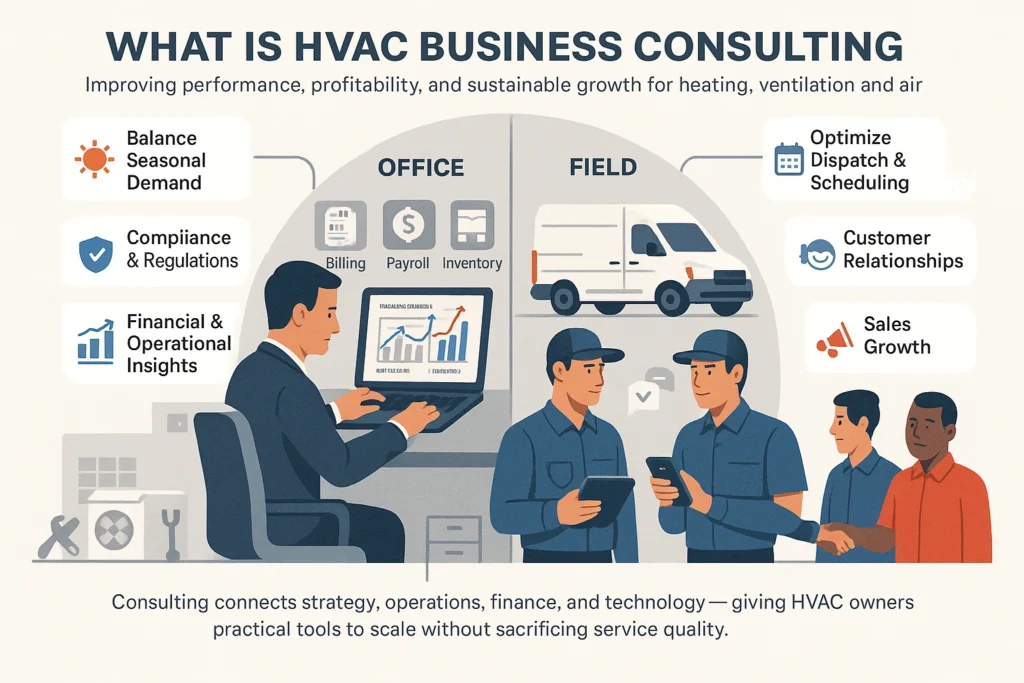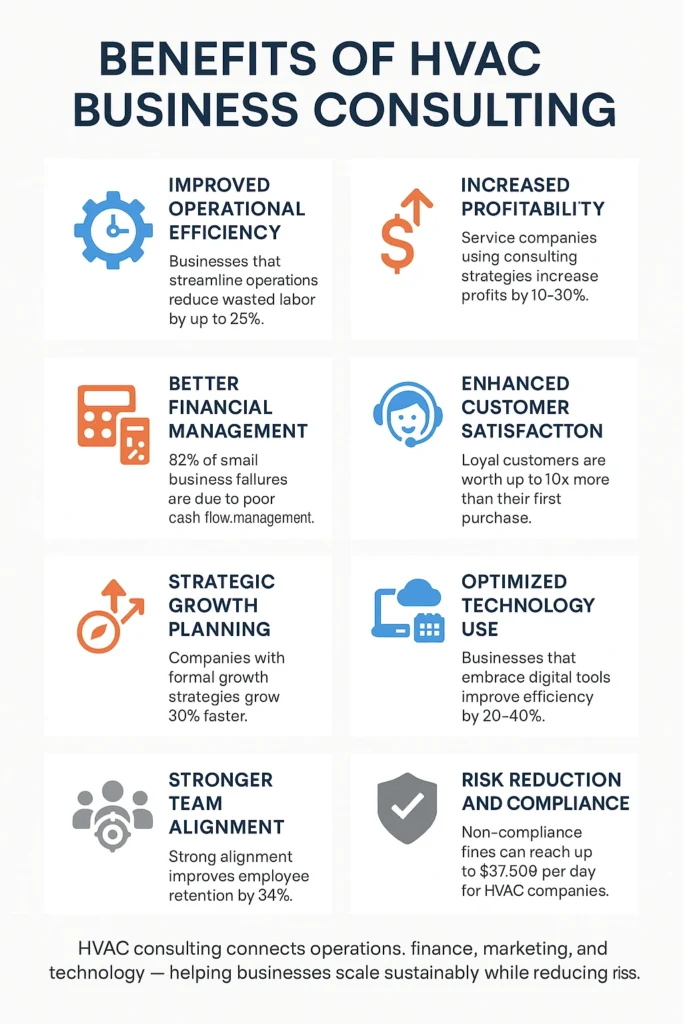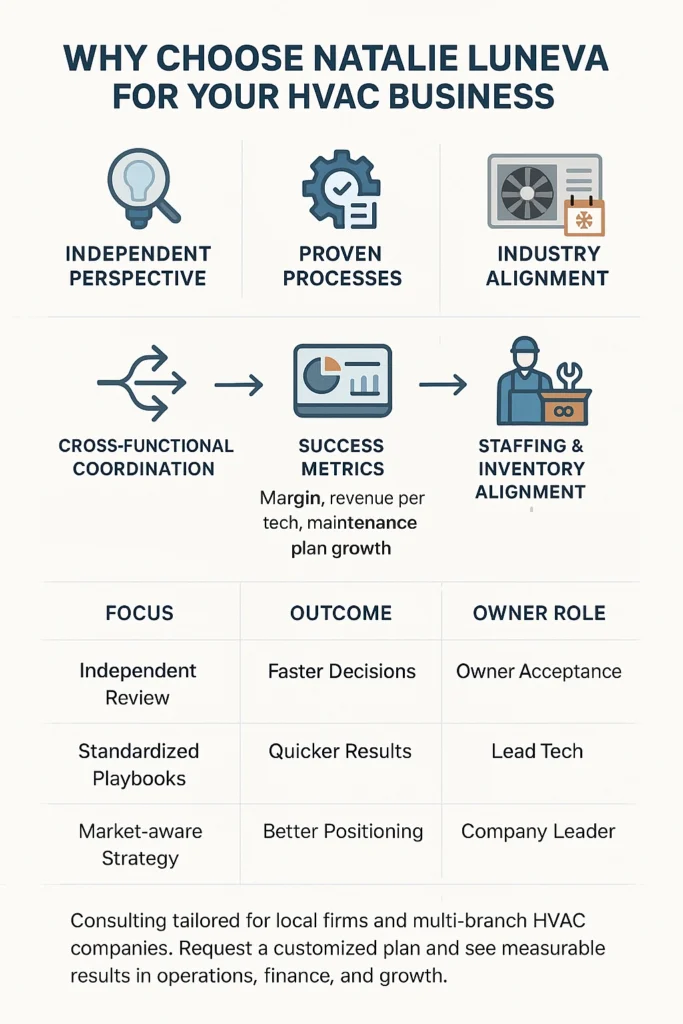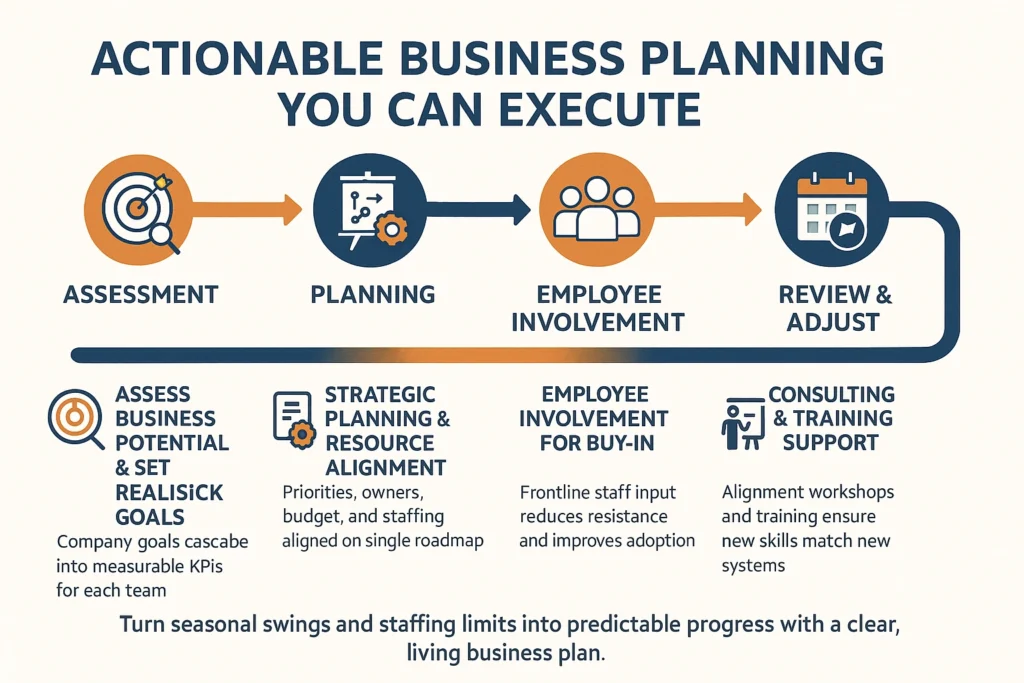HVAC business consulting helps heating, ventilation, and air conditioning companies strengthen their operations and grow with confidence. It goes beyond technical expertise to address the business side, strategic planning, financial management, staffing, customer service, and technology adoption.
Key Takeaways
- Targeted consulting links daily work to long-term metrics for clearer outcomes.
- Assessments identify high-impact fixes and create a prioritized roadmap.
- Blend of strategy, ops, finance, and tech drives measurable gains.
- Solutions fit both residential and commercial service models.
- Owners and teams receive practical frameworks to improve margin and capacity.
What Is HVAC Business Consulting
HVAC business consulting is a specialized service designed to help heating, ventilation, and air conditioning companies improve performance, increase profitability, and build sustainable growth.
Unlike general consulting, it focuses on the unique challenges of service-based HVAC businesses, balancing seasonal demand, managing field technicians, optimizing dispatch and scheduling, ensuring compliance with industry regulations, and maintaining strong customer relationships.
A consultant looks at the entire operation, from back-office processes like billing, payroll, and inventory management to customer-facing systems. They identify inefficiencies, uncover missed revenue opportunities, and create step-by-step strategies that align business goals with daily operations.
HVAC business consulting blends expertise in operations, finance, and technology, and gives owners practical tools and clear direction to scale their companies without sacrificing service quality or profitability.

Benefits of HVAC Business Consulting
Investing in HVAC business consulting can transform the way your company operates, helping you overcome common challenges and achieve long-term growth. By leveraging expert insights, HVAC businesses can streamline operations, boost revenue, and create a more efficient, sustainable organization.
Improved Operational Efficiency
Consultants analyze workflows and processes to identify bottlenecks, helping your team work smarter and complete jobs faster without compromising quality.
Increased Profitability
Through cost management, pricing strategies, and revenue optimization, consulting helps maximize profits while minimizing waste and unnecessary expenses.
Better Financial Management
Experts provide guidance on budgeting, cash flow monitoring, and financial planning, ensuring your business remains financially healthy even during slow seasons.
Enhanced Customer Satisfaction
By improving service delivery, response times, and communication, consulting helps build stronger relationships with clients, leading to repeat business and referrals.
Strategic Growth Planning
Consultants create tailored growth strategies, helping you expand services, enter new markets, or scale operations without overextending your resources.
Optimized Technology Use
From scheduling software to CRM systems, consultants recommend the right tools to automate tasks, track performance, and improve overall business efficiency.
Stronger Team Alignment
HVAC business consulting ensures your staff understands company goals, roles, and expectations, fostering collaboration and reducing employee turnover.
Risk Reduction and Compliance
Experts help identify potential risks, ensure regulatory compliance, and implement procedures that protect your business from costly mistakes or legal issues.

HVAC Business Consulting Tailored to Your Company
Targeted help translates shifting demand into clear operating priorities. Teams get streamlined workflows, smarter resource alignment, and pricing practices that lift cash flow and profit across residential and commercial service work.
What this means for owners and teams
We define this work as a structured process: diagnose constraints, prioritize opportunities, and execute focused improvements across operations, sales, and finance.
A tailored approach accounts for service mix, market position, labor capacity, and seasonality. Realistic goals get assigned to accountable owners so progress is trackable.
Outcomes you can expect in the current market
Near-term wins include faster dispatch-to-door times, higher first-time fix rates, improved average ticket, stronger maintenance conversions, and fewer callbacks.
Dashboards provide visibility into response times, conversion rates, revenue per tech, and profit by job type. Pricing reviews and budget controls stabilize cash flow and improve margins.
- Training and coaching turn new processes into daily habits.
- Technology, mobile workflows, parts visibility, and automated reminders, boosts satisfaction.
| Focus Area | Near-Term Outcome | Impact on Revenue & Profit | Owner Role |
| Dispatch & Scheduling | Shorter response times | More jobs per tech, higher revenue | Assign dispatcher KPI |
| First-Time Fix & Training | Higher fix rates | Lower callbacks, improved profit | Lead tech coaching |
| Pricing & Budgets | Stabilized cash flow | Better margins, predictable monthly revenue | Owner-led review |
Tailored consulting gives owners and teams the clarity and systems needed to win in today’s market. A strong CTA section will appear before the conclusion to guide your next steps.
Why Choose Natalie Luneva for Your HVAC Business
Natalir Luneva brings a clear, independent lens that turns operational noise into actionable priorities. Our work blends objective analysis, repeatable process tools, and hands-on industry knowledge to speed results and reduce bias.
Independent perspective, proven processes, and industry alignment
An independent perspective challenges assumptions and surfaces blind spots owners often miss. That view creates new routes for growth and efficiency without internal politics getting in the way.
We apply proven processes, assessment frameworks, prioritization matrices, and implementation playbooks, to cut trial-and-error. Those tools let teams act fast and measure impact across operations, finance, and technology.
- Deep alignment with seasonal demand, tech staffing, and parts lead times.
- Cross-functional coordination between service, dispatch, and sales.
- Early agreement on success metrics such as margin, revenue per tech, and maintenance plan growth.

Across local firms and multi-branch companies, our consultant team scales scope and cadence so owners reach the next level of growth. Request a customized plan this year and see how objective strategy drives measurable success in the market.
Core HVAC Business Consulting Services We Provide
We provide focused service lines that close gaps in growth, operations, and customer care. Below is a concise catalog that links each offer to measurable outcomes, owners, and timelines. Choose the services that match your immediate priorities and get a prioritized roadmap for execution.
Strategy consulting: market positioning, expansion, and differentiation
Define positioning, service mix, and expansion priorities using competitive analysis and market data. This strategy work identifies growth paths and differentiation that raise market share.
Operations consulting: workflow optimization and cost reduction
Map field and back-office processes, remove bottlenecks, and apply lean practices to lower cost-to-serve and speed cycle times.
Financial consulting: pricing, budgeting, and cash flow
Set pricing frameworks, job-costing discipline, and budget-to-actual reviews that stabilize cash flow and improve margins.
Technology consulting: IoT, automation, and systems integration
Evaluate dispatch, CRM, FSM, payment and inventory systems. Recommend IoT and automation to boost responsiveness and first‑time fix rates.
- Standardized process documentation and training for consistent service delivery.
- Change coordination with managers so consultants ensure adoption and accountability.
- A prioritized roadmap that sequences initiatives, assigns owners, and defines KPIs.
- Industry-specific templates, maintenance offers, tune-up checklists, and scripts, speed implementation.
- Continuous management reviews to track results and adjust resourcing.
| Service | Near-Term Outcome | Owner |
| Strategy | Clear expansion plan | Owner / Leader |
| Operations | Lower cost per job | Operations Manager |
| Technology | Faster dispatch & fixes | IT / Field Lead |
Training and Coaching for Your HVAC Team
Targeted skill development builds consistency across technicians, CSRs, and managers. Structured training turns playbooks into daily habits that improve quality, reduce callbacks, and lift customer satisfaction.
Sales, technician, CSR/dispatch, and management training
Role-specific tracks cover sales fundamentals, technician diagnostics, CSR conversion, and management coaching. Sales sessions teach needs discovery, options presentation, and ethical enrollment in maintenance plans for home services.
Technician coaching focuses on diagnostic accuracy, clear homeowner communication, and first-time fix techniques that cut callbacks. CSR and dispatch training improves call conversion, schedule density, and on-time arrival, anchoring a better customer experience.
Management training builds coaching rhythms, KPI reviews, and process adherence so gains stick.
Community and mastermind learning to share best practices
Peer groups and mastermind cohorts let companies share scripts, checklists, and policies so teams borrow proven approaches instead of reinventing them.
National programs like Trusted Technician, Trusted Advisor, and CSR/Dispatch combine curriculum and peer learning. An industry leader reports supporting over 1,000 HVAC and plumbing companies, showing scale and impact for residential-focused teams.
- Blended learning: live sessions, workshops, and on-the-job coaching to transfer skills to field performance.
- Mastermind feedback loops for metric comparison and rapid adoption of better procedures.
- Clear role tracks so each person knows expectations and development milestones.
| Track | Primary Outcome | Who Leads |
| Sales & Enrollment | Higher maintenance sign-ups | Sales Lead |
| Technician Skills | Fewer callbacks, higher FTF | Lead Tech |
| CSR/Dispatch | Better conversion & on-time arrival | Operations Manager |
Consistent training is the backbone of reliable service delivery and scalable growth for home-focused companies. A CTA appears later inviting business owners to request a customized plan and coaching tailored to their company.
Actionable Business Planning You Can Execute
A clear, executable plan turns seasonal swings and staffing limits into predictable progress. Assess market dynamics, service mix, pricing, and capacity at both technician and CSR levels. That assessment becomes the foundation for realistic goals and an executable roadmap.
Assessing business potential and defining realistic goals
Translate findings into company-level targets that cascade to departmental and individual KPIs. Keep goals specific, time-bound, and tied to measurable outcomes so the team understands what success looks like.
Strategic planning and resource alignment
Build a one-page plan that sequences priorities, names owners, and aligns staffing, budget, and tools to each initiative. Document core process changes and update SOPs so improvements are repeatable across shifts.
Employee involvement for accountability and buy-in
Engage employees early to surface frontline needs and secure buy-in. Involving field and office staff reduces resistance and uncovers practical fixes that improve adoption.
Regular reviews and plan adjustments to stay agile
Establish a management cadence, weekly, monthly, quarterly, to track progress, unblock issues, and reallocate resources as priorities shift. Use a change log to record decisions and keep momentum when market needs evolve.
- Use consultants to run alignment workshops and define KPIs executable within the year.
- Schedule training alongside process rollouts so skills match new expectations.
- Keep the plan living: balance strategic focus with agility so goals remain achievable.

Streamlining Operations and Supply Chains
Plugging workflow leaks often delivers the fastest lift in margin and customer satisfaction. Consultants analyze end-to-end flows, from call intake to follow-up, to find delays, handoffs, and rework. That diagnostic drives a short roadmap for faster execution.
Identifying bottlenecks and eliminating redundant work
Map the real work: dispatch, onsite diagnosis, parts sourcing, repair, and closeout. Standardize forms and checklists to cut manual steps.
- Integrate systems to reduce duplicate data entry and speed approvals.
- Set truck stock standards to improve first-time completion rates.
- Benchmark cycle time and callback rates to set targets for improvement.
Supplier management and inventory strategies that improve responsiveness
Adopt tiered vendor relationships, min/max reorder points, and demand forecasting tied to seasonality.
- Real-time inventory visibility across trucks and warehouses.
- Automation for scheduling, reminders, and customer updates.
- Cross-functional workshops led by a consultant to align service, purchasing, and warehouse teams.
| Focus | Near-term Outcome | Owner |
| Parts & Inventory | Fewer emergency buys | Warehouse Lead |
| Field Processes | Higher first-time fixes | Lead Technician |
| Operations Dashboard | Early issue detection | Operations Manager |
Execution support links these improvements to your CTA: we build the plan, train teams, and track metrics so changes stick and deliver measurable results for hvac companies and similar businesses.
Profitability, Risk Reduction, and Growth Metrics
A tight set of metrics and contingency plans keeps cash flowing and reduces surprises. Consultants run financial analyses to refine pricing, improve cash flow, and maximize profit. They link those findings to clear actions that managers can execute this quarter.
Improving margins through pricing, mix, and productivity
Review pricing against warranty cost and competitor positioning to capture fair margin while keeping conversion. Shift service mix toward higher-margin offerings and maintenance plans to smooth revenue and profits across seasons.
Boost productivity with capacity planning, schedule density, and first-time fix improvements tied to technician enablement.
Risk assessment, contingency planning, and compliance
Build a risk register for supply, regulation, and staffing risks. Add contingency steps and compliance checklists for safety, licensing, and documentation to reduce exposure.
KPIs and dashboards that keep your company on track
- Track revenue per tech, average ticket, callback rates, and maintenance plan growth.
- Use cohort analysis by lead source to optimize sales spend.
- Engage a consultant to set metric definitions, data rules, and review cadences.
| Focus | Metric | Target | Owner |
| Pricing & Mix | Average Gross Margin | Increase 3–5 pts | Finance Lead |
| Productivity | Revenue per Tech / Day | +10% over 90 days | Operations Manager |
| Risk & Compliance | Open Risk Items | Zero critical items | Compliance Officer |
Measured outcomes feed the next step: request a customized plan and a consultant will translate these KPIs into a prioritized roadmap with owners, timelines, and tracking tied to your CTA.
Who We Serve in the HVAC Industry
From single‑truck startups to multi‑branch firms, we help teams align priorities and measure progress. Our work fits owners, contractors, and the staff who deliver service in homes and commercial sites across the United States.
We support a range of company sizes and market types. Engagements are scoped for local firms or multi‑location operations and tuned to regional demand, seasonality, and compliance needs.
- Owners and leadership seeking growth, higher margins, and consistent execution across branches.
- Contractors focused on residential home calls or those with commercial maintenance and project work.
- Companies at startup, stabilization, or scale stages with right‑sized plans and cadences.
- Businesses operating in dense metros, suburbs, or regional territories needing tailored playbooks.
- Teams requiring training, role clarity, and cross‑functional accountability for better customer outcomes.
Multi‑location reviews harmonize KPIs while preserving local agility so each company can deliver a consistent experience.
Grow Your HVAC Business with Natalie Luneva HVAC Business Consulting and DepositFix
Unlock stronger cash flow, streamlined operations, and sustainable growth by combining Natalie Luneva’s proven HVAC business consulting with DepositFix’s powerful payment automation.
With over a decade of experience in operational systems, Natalie helps blue-collar service providers, like HVAC contractors, implement smart systems, clarify strategy, and build profit-driving momentum.
When paired with DepositFix’s full-stack payment platform, you gain seamless automation of invoicing, billing, and receivables: generate customizable payment forms and direct payment links, send automatic reminders, and accept diverse payment methods, all integrated directly into CRMs like HubSpot, QuickBooks, Monday, and more.
Add in advanced features such as draft invoices (perfect for service adjustments), client self-service billing portals, secure payment processing, recurring billing/subscriptions, robust reporting, and scalable infrastructure, and you have a modern, efficient way to reduce manual work, recover more revenue, and keep your team focused on delivering exceptional HVAC services.
Why this works for your HVAC business:
- Strategic clarity meets efficient execution: Natalie brings operational expertise; DepositFix amplifies it with automation.
- Streamlined billing, faster payments: Avoid late invoices and payment headaches with reminders, flexible forms, and CRM sync.
- Professional, consistent customer experience: Branded invoices and self-service portals build trust and reduce support friction.
- Scalable operations: Whether you’re handling more clients or adding services, DepositFix grows with you, while Natalie equips you to scale smartly.

Request a consult today and align your owners, team, and systems so this year yields measurable growth without overwhelming daily work. We scale pace to your capacity and stay hands‑on until results hold.
Conclusion
Coordinated strategy and daily systems make growth predictable and repeatable. A focused plan that links planning, operations, sales, and finance equips your company to execute consistent work and win in the local industry.
Aligning SOPs, training, and tools to your needs turns improvements into routine habits. Clear process steps and review cadences keep teams agile and accountable.
Consultants help convert opportunities into repeatable actions that improve the customer experience and lift profits. The most effective way forward is an actionable plan tailored to your service model and goals.
Take the next step now: request your customized plan and coaching to translate intent into measurable success. The right strategy, implemented the right way, guides teams to deliver reliably for customers and capture lasting profits.
FAQs
How do I know if my HVAC company needs a consultant?
If you’re experiencing inconsistent revenue, high callback rates, scheduling bottlenecks, or difficulty scaling beyond your current capacity, it’s a strong sign that consulting can help. Even profitable firms often use consultants to improve margins, prepare for expansion, or build systems that make results more predictable.
How long does it take to see results from HVAC business consulting?
Some improvements, like dispatch efficiency or pricing adjustments, can yield results in the first 30–60 days. Broader initiatives such as training programs, or cultural shifts usually show measurable impact over 3–6 months.
Is HVAC business consulting only for companies facing problems?
No. Many firms engage consultants proactively when planning growth, opening new branches, or entering new markets. Even stable companies benefit from outside perspective to surface blind spots and optimize margins before challenges become urgent.
How do I choose the right HVAC business consultant?
Look for a consultant with direct HVAC or service industry experience, proven frameworks, and a track record of measurable results. A strong consultant should provide a clear roadmap, assign accountability, and align recommendations with your market realities and company size.


